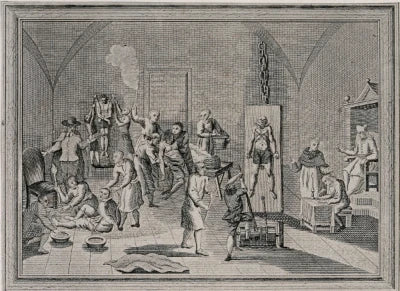Explaining the Obvious
Christians wonder why I call them "stupid" and other choice words or just assume I'm angry with them. The obvious, dangerous nature of Christianity that goes ignored, provokes my name-calling because to not see these risks results from stupidity or willful ignorance. How could they not be stupid or deliberately ignorant when Christianity, practiced by billions across the globe, holds immense sway over societies and individuals alike. All faith-derived power holds a dark side of breeding intolerance, division, and violence. If you do not critically examine the things you believe, you become prone to these issues, readily seen in Christian teachings, practices, and historical impact on society. Herein, I explain, again, the danger of Christianity so mindless Christians can try to grasp the obvious.
The Dangerous Doctrines of Christianity
At the core of Christianity lies a set of doctrines that foster intolerance and exclusion. Among these are the beliefs in salvation through faith alone, the supremacy of God's word over all other forms of knowledge, and the notion that Christians are called to convert non-believers at any cost. These tenets create a sense of superiority among believers that leads to aggressive missionary efforts, persecution of those who do not adhere to Christian beliefs, and even acts of violence in the name of religion.
Salvation Through Faith Alone
One of the key teachings of Christianity is that salvation is attained solely through faith in Jesus Christ. This belief fosters an attitude of self-righteousness among believers, as they are led to believe their acceptance by God is based solely on their personal belief in a specific set of doctrines. Such a mindset can lead to the dehumanization of non-believers and the justification of acts of aggression against those who hold different beliefs or lifestyles.
The Supremacy of Scripture
Another dangerous doctrine within Christianity is the notion that God's word, as revealed in the Bible, holds absolute authority over all other forms of knowledge. This belief can lead to an unwillingness to engage with scientific, historical, and cultural evidence that may challenge or contradict Christian teachings. Such a mindset can hinder intellectual progress, stifle critical thinking, and contribute to a lack of empathy for those who hold different views or come from diverse backgrounds.
The Call to Convert Others
Christianity teaches that believers are called to spread the gospel and convert non-believers in order to save their souls. This missionary impulse can lead to aggressive efforts to impose Christian beliefs on others, often without regard for the cultural, religious, or personal autonomy of those being targeted. Such actions can result in feelings of oppression, persecution, and alienation among non-Christian communities.
The Historical Impact of Christianity
Throughout its history, Christianity has been responsible for numerous acts of violence, persecution, and cultural erasure. From the Crusades to the Inquisition, from colonialism to modern-day religious extremism, the religion's influence has often been destructive and oppressive. This section will explore some of the most significant historical events and movements that illustrate the true danger posed by Christianity.
The Crusades (1095-1291)
One of the most notorious episodes in Christian history, the Crusades were a series of religious wars fought between Christians and Muslims over control of the Holy Land. These campaigns were marked by brutal violence, forced conversions, and widespread destruction of non-Christian religious sites and artifacts. The Crusades represent a stark example of how Christianity can be used to justify acts of aggression and violence in the name of religion.
The Inquisition (12th-19th centuries)
Another dark chapter in Christian history, the Inquisition was a series of investigations and trials carried out by Catholic authorities to identify and punish heretics - those who held beliefs or engaged in practices that deviated from official church teachings. These proceedings often resulted in severe punishment, including torture, imprisonment, and execution. The Inquisition serves as a chilling reminder of the lengths to which Christians have gone to enforce their doctrines and suppress dissenting views.
Colonialism and Cultural Erasure (15th-20th centuries)
Christianity played a significant role in the European colonization of Africa, Asia, and the Americas. In many cases, missionaries accompanied explorers and settlers, seeking to convert indigenous populations to Christianity. This process often involved the suppression of local religious beliefs and practices, as well as the erasure of non-Christian cultural traditions. The legacy of these colonial endeavors can still be seen today in the ongoing struggles for cultural identity, self-determination, and social justice among formerly colonized peoples around the world.
Modern Religious Extremism
Despite many Christians claiming to embrace more inclusive and tolerant views, there remains large pockets of religious extremism within the faith. These groups often promote intolerance, violence, and political oppression in their efforts to enforce strict adherence to Christian doctrines. The rise of Christian Nationalism in the United States, guided by Republicans, is s stark example of the danger of extremism, which cannot be ignored.
A Significant Threat
Christianity presents a significant threat to global peace, tolerance, and mutual understanding. Its teachings foster intolerance, exclusion, and aggression, while its history is marked by numerous acts of violence, persecution, and cultural erasure. It is crucial we remain vigilant in recognizing and addressing the true dangers posed by this religion, both within our own communities and on the global stage. Even more important, Christians need to recognize their dangerous nature, admit the problem to themselves, and begin correcting their religion, or abandon it.
Photo: V0041650 The inside of a jail of the Spanish Inquisition Copyrighted work available under Creative Commons Attribution only licence CC BY 4.0































































































